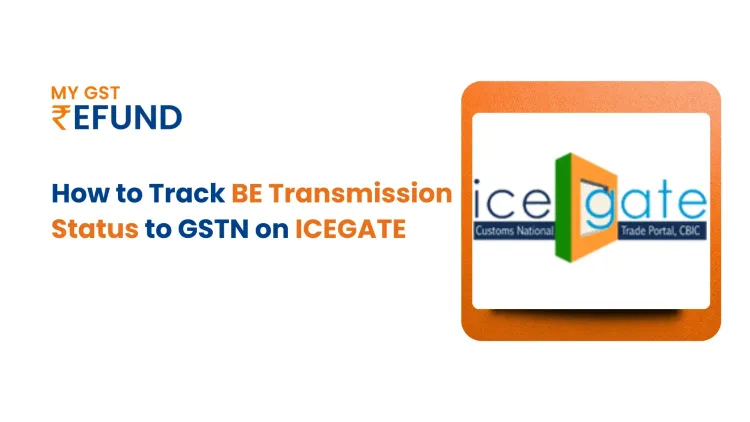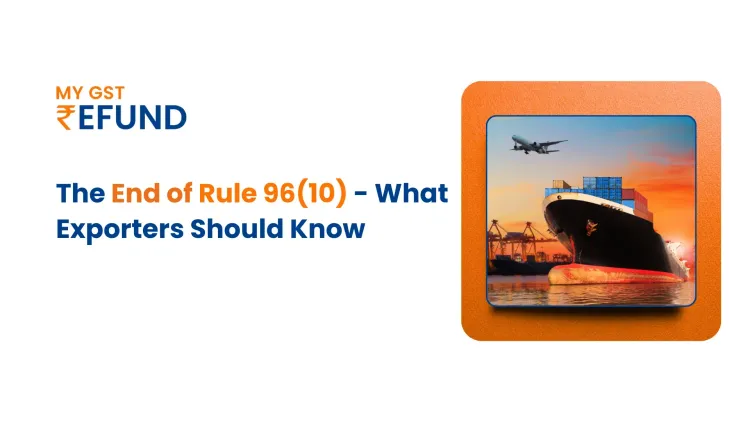All About Goods Transport Agency (GTA) Under GST- MyGST Refund
Published on: Mon Jun 05 2023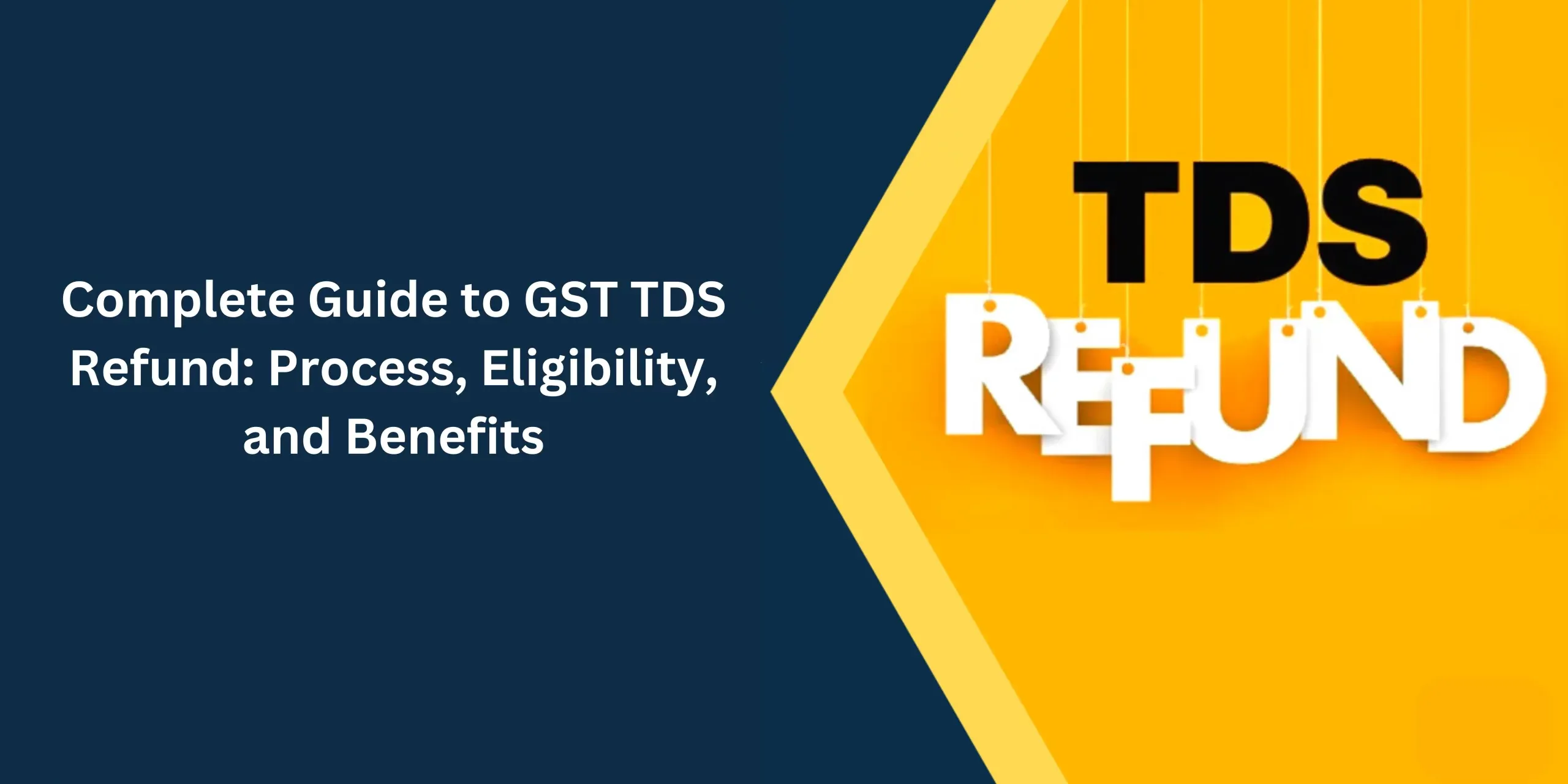
Introduction of GTA Under GST
GTA refers to “Goods Transport Agency” and it is defined as any person who provides services in relation to the transport of goods by road and issues a consignment note. Under the Goods and Services Tax (GST) regime in India, services provided by GTA are taxable.
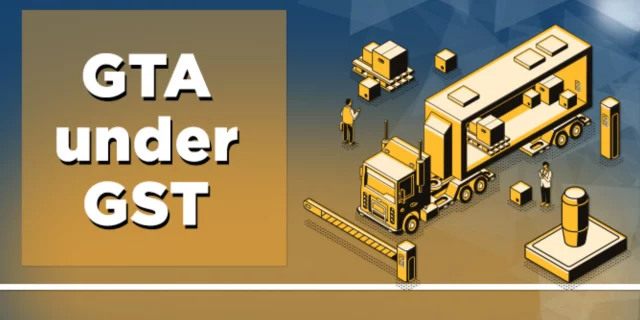
GTA services are classified as “Transport of Goods by Road” under GST and are taxed at a rate of 12%. However, if the Goods Transport Agency does not issue a consignment note, then it is not considered as a GTA and will be taxed under the “Other Services” category, which attracts a tax rate of 18%.
Goods Transportation in India
Under the Goods and Services Tax (GST) regime in India, transportation of goods by road is classified as a service and is taxable. The GST rate on the transportation of goods by road varies depending on the type of transportation service provider.
Goods Transport Agency services are classified as “Transport of Goods by Road” under GST and are taxed at a rate of 12%. GTA services are defined as any person who provides services in relation to the transport of goods by road and issues a consignment note.
However, if the GTA does not issue a consignment note, then it is not considered as a Goods Transport Agency and will be taxed under the “Other Services” category, which attracts a tax rate of 18%.
What service of transportation of goods is exempt under GST?
- Transport of personal use or household goods
- Transport of goods of unregistered persons
What is a GTA?
A GTA or Goods Transport Agency is an individual who offers a service that pertains to the transportation of goods through roadways and provides a consignment note, which may be known by any other name.
What is a consignment note?
The definition of a consignment note is not provided in the GST law, but it can be inferred from the Explanation to Rule 4B of the Service Tax Rules, 1994. According to this rule, a consignment note is a document that a goods transport agency issues after receiving goods for transportation by road in a goods carriage. The consignment note is serially numbered and includes the name of the consignor and consignee, the registration number of the carriage of the goods used for transportation, details of the goods being transported, the place of origin and destination, and the party liable for paying the service tax, whether it is the consignor, consignee, or the goods transport agency.
What are the services provided by a GTA?
- Transportation of goods by road using their own or hired vehicles.
- Loading and unloading of goods during transportation.
- Packaging and labelling of goods to be transported.
- Preparation of documents and consignment notes required for transportation.
- Providing insurance for goods during transportation, if requested by the consignor.
- Providing assistance in obtaining necessary permits and licenses required for transportation.
- Coordinating and managing the transportation of goods from the point of origin to the final destination.
What was the situation under Service Tax?
Typically, the service provider is responsible for paying the service tax, but the Reverse Charge Mechanism can make the service receiver responsible for paying the tax and following the regulations of the Finance Act, of 1994. The person who is responsible for paying the freight for the transportation of goods is also made responsible for paying the service tax in the case of GTA. If the person responsible for paying the freight is in a non-taxable area such as Jammu & Kashmir, they become the service provider and are liable to pay the service tax. The Service Tax includes a provision that exempts the customer from paying the service tax for the taxable service provided by a goods transport agency in situations where: –
The exemption from service tax for a taxable service provided by a goods transport agency applies in situations where the total amount charged for transporting goods in a single carriage is not more than one thousand five hundred rupees, or
Where the amount charged for transporting an individual consignment, which refers to all the goods transported for a single recipient in one carriage, does not exceed seven hundred and fifty rupees.
What is the rate of GST on GTA?
If a Goods Transport Agency chooses to pay taxes on a forward-charge basis, they are responsible for paying the tax on the services they have provided. The rate of GST applicable for this is either 5% (without input tax credit) or 12% (with input tax credit). If a GTA does not opt for forward charging, the responsibility of paying the GST shifts to the recipient of the service. Under the reverse charge mechanism, the applicable rate of GST is 5%.
Is a GTA liable to register?
Under this Act, every supplier who makes a taxable supply of goods or services or both from a State or Union territory shall be obligated to register if their aggregate turnover in a financial year surpasses the threshold limit.
Scenarios for Registration for a Goods Transport Agency
- Interstate Transportation: If a GTA is providing transportation services from one state to another, it is required to register under GST, regardless of its turnover.
- Casual Taxable Person: If a GTA is providing transportation services as a casual taxable person, it is required to register under GST irrespective of its turnover.
- Reverse Charge Mechanism: If a GTA is providing transportation services to a registered person who is required to pay tax under the reverse charge mechanism, it is required to register under GST, even if its turnover is below the threshold limit.
- Input Tax Credit: If a GTA wants to claim Input Tax Credit (ITC) on the GST paid on inputs such as fuel, maintenance, and repairs used for providing transportation services, it needs to register under GST.
- E-commerce Operators: If a GTA is providing services to e-commerce operators, it is required to register under GST, regardless of its turnover.
Who pays GST while hiring a GTA?
The liability to pay GST while hiring a Goods Transport Agency depends on whether the GTA has opted for the forward-charge mechanism or not. If the GTA has opted for the forward-charge mechanism, they will pay GST on the services provided by them, and the customer does not have to pay any additional tax. However, if the GTA has not opted for the forward-charge mechanism, the liability to pay GST shifts to the recipient of the service. In such cases, the customer who hires the GTA will have to pay GST under the reverse-charge mechanism, which is currently 5%.
Which businesses are liable to pay GST under reverse charge for a GTA?
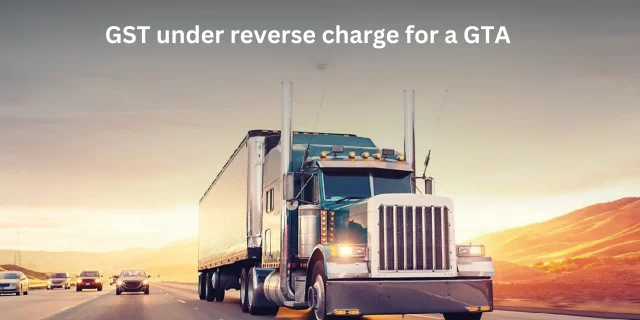
Notification No. 5/2017-Central Tax, issued on 19/06/2017, states that a Goods Transport Agency (GTA) is exempt from registering under GST if it only transports goods to a registered person, even if the GTA’s turnover exceeds the threshold limit. In such cases, the registered person is required to pay the entire tax under the reverse charge mechanism.
Who will pay under Reverse Charge?
Regardless of their turnover, any individual who is responsible for paying tax under the reverse charge mechanism must be registered under GST. When tax is paid under the reverse charge, the supplier of goods or services is eligible for input tax credit, provided that the credit is utilized for business purposes only.
Various Scenarios to Determine who is liable to pay GST in the case of a GTA
The liability for paying Goods and Services Tax (GST) in the case of a Goods Transport Agency (GTA) depends on various scenarios, such as:
- If the GTA is registered under GST: In this case, the GTA is liable to pay the GST on their services and can claim Input Tax Credit (ITC) for the taxes they paid on their inputs.
- If the recipient of the GTA services is registered under GST: In this scenario, the recipient is liable to pay the GST on the transportation services under the Reverse Charge Mechanism (RCM). The recipient can claim ITC for the taxes paid on the services received from the GTA.
- If the recipient of the GTA services is an unregistered individual or a business not required to register under GST: The GTA is liable to pay GST on their services. They cannot claim ITC for the taxes they paid on their inputs in this case.
- If the GTA provides services to an Exporter: If the GTA is providing transportation services to an Exporter, the GTA is not required to pay GST as it is considered as an export of service.
- If the GTA provides services to a person located outside India: In this case, the GTA is not required to pay GST as it is considered as a supply of service outside India.
Reverse Charge if the GTA Is Unregistered
If a Goods Transport Agency (GTA) is unregistered under the Goods and Services Tax (GST), the responsibility for paying the service tax under the Reverse Charge Mechanism falls on the recipient of the transportation service, also known as the service receiver. The recipient must pay the tax directly to the government and comply with other provisions of the GST Act.
Input Tax Credit
- If GTA pays GST
If a Goods Transport Agency (GTA) pays GST on the goods transport services it provides, it can claim Input Tax Credit (ITC) on the GST paid. The ITC can be claimed by the GTA on the GST paid on the inputs such as fuel, maintenance, and repairs used for providing transportation services. However, it is important to note that the ITC can only be claimed if the GTA is registered under GST and the transportation services provided are taxable. If the GTA is providing exempted transportation services, it will not be eligible to claim ITC on the GST paid.
- If Service Receiver pays GST under RCM
If a service receiver pays GST under the Reverse Charge Mechanism (RCM) for the services received, they can claim Input Tax Credit (ITC) on the GST paid. The ITC can be claimed by the service receiver on the GST paid on the services received, which can be utilized to offset their GST liability.
Invoicing for GTA
- Name of the consignor and the consignee
- Number of goods carriage registrations used to transport the goods
- Details of goods transported
- Gross weight of the consignment
- Details of place of origin and destination
- GSTIN of the person liable for paying tax whether as consigner, consignee, or goods transport agency
- Name, address, and GSTIN (if applicable) of the GTA
- Tax invoice number (it must be generated consecutively and each tax invoice will have a unique number for that financial
- year)
- Date of issue
- Description of service
- Taxable value of supply
- Applicable rate of GST (Rates of CGST, SGST, IGST, UTGST, and cess clearly mentioned)
- Amount of tax (With the breakup of amounts of CGST, SGST, IGST, UTGST, and cess)
- Whether GST is payable on a reverse charge basis
- Signature of the supplier
Payment of Tax by a GTA
A Goods Transport Agency (GTA) is not eligible to claim Input Tax Credit (ITC) on any of their inputs. Therefore, they can only pay the service tax through cash using standard payment methods such as card, net banking, cash, UPI, or IMPS (only for taxes up to Rs. 10,000).
Returns to be Filed by a GTA
If a Goods Transport Agency (GTA) provides services that are subject to tax, the tax payment is done through the reverse charge mechanism. However, if a Goods Transport Agency registers under the Goods and Services Tax (GST), they must file returns related to their outward and inward supplies, as well as a summary return (GSTR 1, GSTR 2, GSTR 3) before their respective due dates. Failing to file these returns will result in the GTA having to pay interest and penalties.
How to determine the Place of Supply for a GTA
For services related to the transportation of goods, including by mail or courier, the place of supply will vary depending on the recipient. If the recipient is a registered person, then the place of supply will be their location. If the recipient is not a registered person, then the place of supply will be the location where the goods were handed over for transportation.
Examples for determining the place of supply
- When the recipient of the GTA service is a registered person:
Suppose a GTA provides transportation services to a registered business in Mumbai. In this case, the place of supply will be Mumbai, and the recipient will be liable to pay GST under the Reverse Charge Mechanism (RCM).
- When the recipient of the GTA service is an unregistered person:
Suppose a GTA provides transportation services to an individual in Delhi who is not registered under GST. In this case, the place of supply will be Delhi, and the GTA will be liable to pay GST.
- When the GTA provides services for the export of goods:
Suppose a GTA provides transportation services for the export of goods from Bangalore to New York. In this case, the place of supply will be outside India, and the transportation service will be considered as an export of service. Hence, the GTA is not liable to pay GST.
- When the GTA provides services for the movement of goods within the same state:
Suppose a GTA provides transportation services for goods within the state of Gujarat. In this case, the place of supply will be Gujarat, and the GTA will be liable to pay GST.
Are you Looking for GST Refund Service? Mygstrefund.com offers GST Refund on business, exports, and many more if your GST application is rejected. Get in touch with us today.
Related Posts



